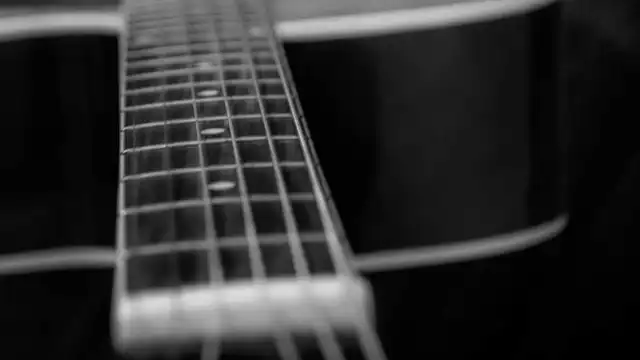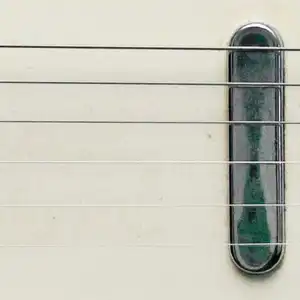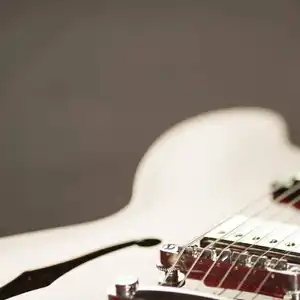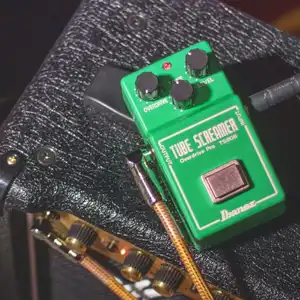Which Guitar Strings Wear Your Fret Wire Down More?


Be sure to subscribe to our YouTube channel to keep up with more great videos like this one:

Transcription
What's up everybody, I'm Scott from Stringjoy guitar strings and today we're taking a suggestion from a commenter on a previous video. To talk a little bit about fret wire on guitars and most specifically what strings do to your fret wire and why different strings have different effects on the fret wire of your guitar. To understand all this, we're going to have to give you a little bit of a bare bones introduction to metallurgy. So that you can understand a little bit about how different metals effect one another. The first thing to talk about in that regard are the frets themselves. Typically, you've heard of frets described as nickel silver. That's kind of a misnomer because there actually isn't any silver in almost all frets that I've ever encountered. Typically, it's actually about 18 or so percent nickel and about 80% copper with a couple of the trace elements making up the last 2%. You may have also heard of stainless steel frets, which are a little bit less common and quite a bit more durable. We're going to talk about those more later in the video. Strings on the other hand can contain a number of different materials or different alloys. Everything from stainless steel to music wire, which is a high carbon steel to brass or bronze, different things that have copper and zinc in them, things like these. All of these different alloys or different metals have different effects when you combine them with frets. To understand all this, we're going to have to get a little bit nerdy and talk about Mohs Hardness Scale, which is a scale from one to 10, developed by a German named Friedrich Moh who is a geologist, to describe the hardness of different materials. It goes all the way from things like talc at one to lead one and a half, up to really, really hard things like tungsten carbite or diamond all the way up at 10. Now all the metals or alloys that are relevant to our discussion today are in the lower middle of that scale. Three is where you see a lot of things like copper and brass and bronze. Nickel, I believe is four and then steel is a bit harder than everything else at four and a half. Now to simplify things a bit, one of the features of this scale, is that anything with a higher number will always scratch something with a lower number. So diamond at 10 will definitely scratch talc at one. But even when you get really close together, you know that it's something just a little bit higher on the scale. It's going to scratch whatever is lower than it on the scale all the way down to one. So what does this all have to do with guitar? Well we know that fret wire depending on the alloy composition, which can vary a little bit from manufacturer to manufacturer is going to be somewhere between three and four because of copper and nickel, that are it's main constituent parts. So what this tell us is that it can be scratched by anything higher than four or so, and it won't be scratched by anything lower that let's say three and a half or three. Depending on exactly where that number ends up being. So if we look at something like acoustic guitar strings, whether they're brass or bronze. We know that they're probably not going to have much wearing effect on your frets. However, if you look at things like a typical nickel electric guitar string. That's going to be a little bit higher in terms of hardness than your frets. So it is going to wear out your frets a bit. Now when we get to things like stainless steel or music wire, which is high carbon steel. Those things are pretty substantially higher on the scale than your fret wire. As a result, those are going to scratch the fret wire and wear it down over time. The best way to see this effect is if you look at an old guitar that's been played quite a bit. You'll usually see that the fret markings are all on the playing strings because those are steel and they're quite a bit harder than the fret wire. On electric guitars, your wound stings will eventually wear down your frets. But it can take quite a while. With acoustic guitar strings it isn't usually quite as much of a problem, at least from a metal standpoint. Stainless steel strings, which you'll see on electric guitars quite a bit, especially with people that have nickel allergies or just like really, really bright strings. Those can really mess up frets because you have stainless steel on all of your wound strings in addition to high carbon steel on your playing strings. So potentially every single string on your guitar is wearing down your frets at a pretty aggressive pace. Now the interesting thing about this is that it actually all flips when we look at stainless steel frets. So with stainless steel frets you have frets that are quite a bit harder than the strings that you're playing, which means that your frets are going to actually wear down your strings a lot more quickly. So it really ends up being kind of a balancing act for you as a player. If you have your traditional nickel silver frets, you're going to have to change out your frets every couple of years. Depending on how you play it, whereas if you have stainless steel frets, you're probably almost never going to have to change them. But on the other side, you're going to have change your strings quite a bit more often. Again, it's all finding the balance that works for you, depending on what you care most about. So what do you do if your guitar has quite a bit of fret wear? Whether it's just on the playing strings or on the playing strings and the wound strings. The good news is you've got a few options. The least aggressive option is probably fret leveling. This is where a tech will grind off a certain amount of each fret to get everything where it's nice and even right where it should be. If you have larger frets, this might be a little bit easier. Or if you just don't have that big of dense in each individual fret, it won't be too tough either. If your problems are more substantial, a tech might have to do a total re-fret. Which is where they take all the frets off the neck of the guitar and replace them with new frets and then level those to right where they need to be. You can in some situations also get a partial re-fret. But this really depends on what condition your guitar is in. If it's only the first couple of frets that are really, really worn down. You might be able to get a way with it. But if you have the same problem across the whole neck, you're better off to just get a full re-fret all at once. If none of those sound like a really good time to you, there are a few things you can do to not have to worry about fret wear quite as much. Using lighter strings will sometimes make a little bit of a difference. Not pressing down so hard will certainly make a difference. The one big tip that I will give when it comes to trying to extend the lifespan of your guitar's frets, is to be careful about what capo you're using or how often you're using it. Capos are the biggest enemy of frets. They squeeze the strings down way harder than you typically would fret them. And obviously over time, that's going to lead to your frets getting a lot more worn, especially in very particular places on the guitar like the early frets on the guitar, where you're most likely using a capo more often. The best thing you can do from this, aside from not using a capo at all, is to find a capo that gives you an adjustable tension, one way or another. A lot of the capos that just have a spring in them and you clamp it on the guitar, goes that hard. Those aren't usually the best option because they tend to squeeze a lot harder than you really need it to. And if you do have a capo that has adjustable tension, I would recommend keeping it only hard enough to not get any buzzing or anything like that. You don't need to squeeze it all the way as hard as you can. So what's your experience with this? Have you seen fret wear develop on a lot of your guitars? Do you have any suspicion as to why this might be? Or are you a player that hardly ever sees fret wear being a problem at all? Let us know down in the comments.Other Posts you may like

Guitar Strings Order: How the Guitar is Tuned and Why

Two Handed Tapping: Our Top 8 Tappers of All Time

What is Nashville Tuning? Its History, Best Guitar Strings & Uses

Guitar Scale Length Explained: String Tension & Playability

What Guitar Strings I Used To Play...

The Secret behind Stevie Ray Vaughan's Guitar Strings
0 Responses
Leave a Reply
Your email address will not be published. Required fields are marked *

